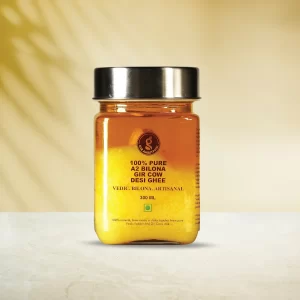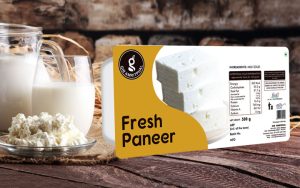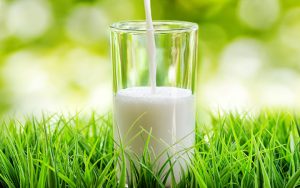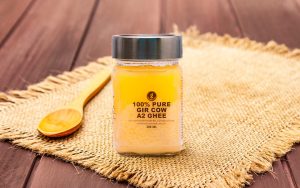Ghee has been a popular food in Indian homes for a long time. It’s not just tasty, it’s also full of good nutrients and has healing qualities.
One of the best things about ghee is how it helps with joint health. It contains healthy fats, vitamins that dissolve in fat, and things that reduce inflammation. These help keep joints moving smoothly, ease stiffness, and support strong bones.
Can Ghee Improve Joint Health? What Research Says is that modern studies now support what Ayurveda has known for a long time, ghee can be a natural way to help with joint problems.
Why Ghee is Beneficial for Your Joints
Can Ghee Improve Joint Health? What Research Says is that ghee contains omega-3 fatty acids, antioxidants, and butyrate, which work together to reduce inflammation, a major cause of joint pain and arthritis.
Regular consumption of pure A2 desi ghee strengthens bones, enhances cartilage health, and provides essential vitamins like A, D, E, and K that are crucial for bone density.
Unlike market ghee, pure desi ghee is free from additives, making it the perfect choice for long-term joint health.
7 Ways Ghee Supports Joint Health- Can Ghee Improve Joint Health? What Research Says

1. Lubricates Joints Naturally
Ghee works like a natural lubricant for your joints, helping reduce the rubbing between bones and making movement easier.
This can help avoid stiffness and pain, especially for older people or those who have joint problems.
Eating pure desi ghee regularly helps keep your joints healthy and well-fed, which supports better movement and flexibility without needing man-made supplements.
2. Reduces Inflammation
One of the main advantages of ghee for joint health is its ability to fight inflammation.
Ghee has omega-3 fatty acids and butyrate, which can help ease swelling and pain from arthritis and other inflammation-related issues.
By naturally reducing inflammation, ghee can help keep joints comfortable over time and lessen the need for pain medication or chemical treatments.
3. Strengthens Bones
Ghee is a great source of fat-soluble vitamins, including Vitamin D, which helps the body absorb calcium. This is important for keeping bones strong and supporting overall bone health.
Including ghee in your everyday meals can help prevent problems like osteoporosis and bone fractures.
It’s a natural and nutritious choice that can improve bone density and support joint health.
4. Enhances Cartilage Health
Cartilage serves as a cushion between bones, and when it wears down, it can cause pain and stiffness in the joints.
Can ghee help with joint health? What Research Says is that ghee nourishes cartilage tissues and supports their regeneration, helping to prevent arthritis and other joint problems.
By improving cartilage health naturally, ghee ensures that your joints remain flexible, pain-free, and resilient against daily wear and tear.
5. Improves Flexibility
Eating ghee regularly helps improve blood flow and supports the health of connective tissues, which makes joints more flexible.
This is especially useful for athletes, older people, or anyone who has trouble moving because of stiff joints.
Ghee reduces friction in the joints and gives them the nutrients they need, so your joints stay flexible, allowing you to move comfortably and stay active for a longer time.
6. Supports Lubrication in Synovial Fluid
Synovial fluid is important for joints to move smoothly without pain. The good fats in ghee help make this fluid thicker, which keeps the joints properly lubricated.
This supports the joints by reducing damage to the cartilage and bones, helping to avoid pain and issues that could develop over time.
Ghee naturally helps keep the joints healthy and well-lubricated.
7. Provides Essential Nutrients
Ghee contains fat-soluble vitamins like A, D, E, and K, which are important for keeping bones strong and preventing joint problems.
These vitamins also help keep the muscles and bones healthy and can reduce the risk of joint issues as you get older.
Eating pure a2 cow ghee regularly gives your body the necessary nutrients to support strong and healthy joints.
How to Include Ghee for Maximum Joint Benefits
Adding 1 to 2 teaspoons of pure a2 bilona cow ghee to your everyday meals can really help with your joints.
You can pour it over hot dishes, use it while cooking, or eat it on an empty stomach in the morning to get the most benefit.
Make sure to pick real, chemical-free desi ghee, like the one from Gir Amritphal, for the best results.
Take Action for Stronger Joints Today!
Don’t wait for joint pain to slow you down. Switch to pure desi ghee for natural, long-lasting joint health.
Explore our premium quality ghee at Gir Amritphal.com and give your body the care it deserves.
FAQ’S
1. Does ghee help in joint pain?
Yes, ghee is considered beneficial for joint pain because it contains healthy fats and fat-soluble vitamins like A, D, E, and K. These nutrients help reduce inflammation and lubricate joints, improving mobility and flexibility.
2. Which food makes joints stronger?
Foods rich in omega-3 fatty acids, calcium, and antioxidants such as ghee, nuts, seeds, and leafy greens can strengthen joints and support overall joint health.
3. What happens when we eat ghee daily?
Eating ghee daily in moderation can improve digestion, strengthen bones and joints, and provide essential nutrients. It also enhances calcium absorption, which is important for bone density.
4. Is ghee good for arthritis?
Yes, ghee can be helpful for arthritis as it contains anti-inflammatory properties and lubricates joints, reducing stiffness and pain.
5. Does ghee increase bone density?
Ghee supports bone density by improving the absorption of fat-soluble vitamins like Vitamin D, which plays a key role in calcium absorption and bone strength.
6. Can ghee increase Vitamin D?
Ghee itself does not produce Vitamin D, but it helps in the absorption of Vitamin D from other sources, improving bone and joint health.
7. Is ghee good for nerve pain?
Ghee is rich in healthy fats that support nerve function and may help reduce nerve pain by nourishing nerve tissues.
8. Is it okay to eat ghee every day?
Yes, consuming ghee daily in moderation is safe and can improve joint and bone health. However, people with high cholesterol or obesity should consult a doctor before increasing ghee intake.
9. Is ghee rich in calcium?
Ghee is not a significant source of calcium, but it enhances calcium absorption in the body when combined with calcium-rich foods.
10. Who should avoid ghee?
People with heart disease, high cholesterol, or those advised to follow a low-fat diet should avoid excessive ghee consumption.
Reference:
https://pubmed.ncbi.nlm.nih.gov/39313022
https://www.sciencedirect.com/science/article/abs/pii/S1098882324000960









